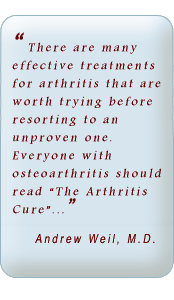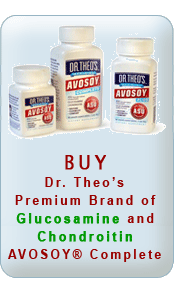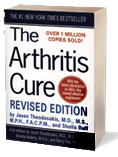Medical Evidence
Glucosamine Basic Science Studies
Chondroitin Basic Science Studies
Glucosamine Clinical (Human) Studies
Chondroitin Clinical (Human) Studies
Combined Clinical (Human) Studies
Review Articles on Glucosamine
Review Articles on Chondroitin
Home Page
News
Supplements
Resources
Products
Books
Q & A
About Dr. Theo
 
|
STOPP (STudy on Osteoarthritis Progression Prevention): “A new two-year trial with chondroitin 4&6 sulfate (CS)"
Study design according to OA guidance -A. Kahan (France)
Clinical results -J.-Y. Reginster (Belgium)
Radiological results -E. Vignon (France)
Objective
STOPP was a prospective, multicentre, randomised, parallel groups, double blind clinical study comparing 24 month orally administered Chondrosulf® (chondroitin 4&6 sulfate) 800 mg oad vs. placebo in patients with knee osteoarthritis.
Methods
A total 600 patients were enrolled (300 patients per group), was targeted in 40 centres from 4 European countries (F, B, CH, A) and the USA. Outpatients of either sex, aged between 45 and 80 years affected by tibio-femoral knee osteoarthritis defined by clinical and radiological criteria were selected. The symptomatic knee (VAS 30 mm) was selected as the target knee since the enrolment for each patient. If both knees were symptomatic, the knee with the narrower joint space was to be selected. If both knees had the same joint space width, the most symptomatic knee was chosen. Patients received Chondrosulf® (chondroitin 4&6 sulfate, CS) 800 mg oral gel (IBSA, Switzerland)
vs. placebo, once-a-day for 24 months . The primary efficacy criteria was the minimal joint space narrowing (JSN) analysed by means of image digitisation. Secondary efficacy criteria were pain using the Huskisson’s VAS. WOMAC algo-functional index, total consumption of paracetamol and authorised NSAIDs. Global efficacy and tolerability were independently assessed by investigators and patients by means of VAS and a semi-quantitative verbal scale respectively. Treatment compliance and biological markers of arthritis for a sub-group of patients were also assessed. Patients underwent control visits on Day-30, Day 1, Month 1, 3, 6, 9, 12, 15, 18, 21 and 24; the evaluations for a single patient was always carried out by the same investigator. Knee X-rays were taken with the subject in standing and in flex position (Lyon-Schuss) at inclusion visit and after 12, 18 and 24 months. X-rays were analysed in blind as per treatment and sequence at the end of the study according to a technique of image digitisation. A statistical analysis (ITT and PP) was carried out by an external, independent centre.
Results
A total of 622 patients meeting the inclusion criteria, 309 in the Chondrosulf® group and 313 in the placebo group, were enrolled by 38 study centres between the years 2000 and 2002. The study groups were balanced at baseline for both demographic and clinical variables, including severity of OA at the target knee. Ninety-three patients (30.1%) in the CS group and 80 patients (25.6%) in the placebo group did not complete the 2-year treatment course; there were no significant differences between groups in the reasons for withdrawal. Likewise, the number of patients showing good compliance according to the protocol was not significantly different between the groups. The 312 patients receiving placebo had a progressive JSN with a mean loss ± SE of 0.24 ± 0.03 mm after 2 years. The mean progressive narrowing was of lower extent in the 309 patients receiving CS (0.10 ± 0.03 mm). The ITT analysis of variance for repeated measurements on the last known JSN value showed a statistically significant positive effect of the CS treatment
(p<0.01). PP analysis confirmed the results obtained with the ITT analysis. The data from the secondary efficacy parameters confirmed the trend in favour of CS with statistical significance at several end-points. The tolerability was very good in both treatment groups.
Conclusions
In this randomised, double-blind, placebo-controlled study CS reduced the joint space narrowing in knee OA in comparison to placebo as assessed by radiographic follow-up over 2 years. Long-term treatment with CS appears to delay radiographic progression in patients with OA of the knee. These results are consistent with those already published by others (B.A. Michel et al., Arthritis and Rheumatism 2005; 3(52): 779-786).
Source
American College of Rheumatology annual meeting November, 2006 Washington DC.
Dr. Theo's Comments
This is the best and largest study proving chondroitin's ability to slow or even halt cartilage loss. This adds to the other large study, of similar design done in 2005 by Beat Michel.
Both studies prove that the disease improving effects of chondroitin do not depend on whether or not a person notices changes in their symptoms.
Now that we have confirmatory evidence of long-term studies utilizing the most sophisticated research methods, it is safe to say that:
Every person with osteoarthritis should be taking at least 800 mg of high quality chondroitin on a sustained basis for two years or longer
whether or not this supplement helps relieve symptoms.
Some of the most stalwart (former) skeptics of glucosamine/chondroitin started taking these supplements personally when reading these two, disease-modifying studies.
If chondroitin was a drug in the US, no doubt it would cost $10-$50 or more per day. Sound crazy? Just look at the prices of other drugs believed to be disease-modifying such as: Diflucan for yeast infections, highly specialized antibiotics (as much as $70 per tablet), biologic agents for Rheumatoid Arthritis (over $1,000 per month), or vaccines like the new Gardasil (about $1,000 for a series of three injections). Also remember that Viagra was intended to be a blood pressure drug to be sold for about 50 cents per day. Even though it is not disease-modifying, when it was learned that Viagra could help with erections, the price of the drug went to $10/day.
It is curious that the US pharmaceutical interests are trying to damage to credibility of glucosamine and chondroitin sold as supplements (probably because they decrease the market for OA drugs) while, at the same time are promoting their own glucosamine and chondroitin products in other countries.
|

Learn about and purchase the book90% of people who follow The Arthritis Cure treatment program don't need anti-inflammatories (like Aleve, Celebrex or Advil).
Dr. Theo warned people that these drugs, used first... read more
|
|




